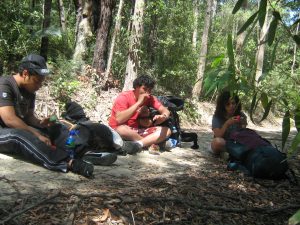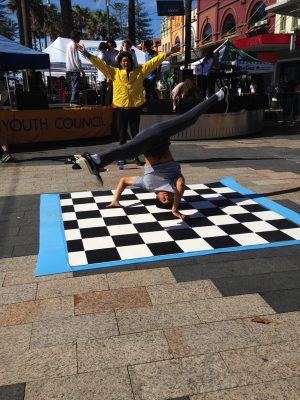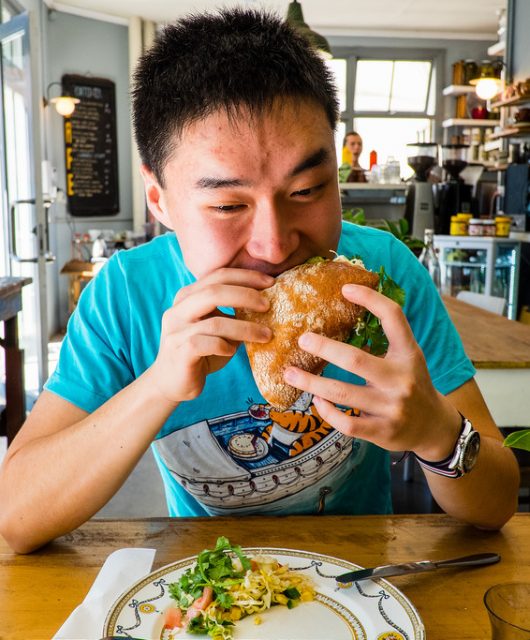It is not often in life that you get the chance to have a thorough conversation with someone who turns another person’s life around as a career. Recently, I had the amazing opportunity to speak with Tim Sheerman, a North Shore youth services worker for almost 20 years. He works at StreetWork, a not-for-profit organisation in Sydney’s North Shore that concentrates on getting young people’s lives back on track.
Founded by Peter Hobbs more than 30 years ago, the initial premise established was that one supportive mentor might be all that is needed to turn a young person’s life around. Youths are constantly changing with the times and they can be difficult to handle.
I decided to piece a story together with Tim, a veteran in his field who has mentored firsthand many different types of youths in the North Shore, on how we can inspire young people in the North Shore.

Be more proactive in your approach
We all have a different normal. My normal and your normal would be different, such as when we breakfast every day or get up every day. I think a young person who’s at risk, doesn’t think something’s wrong with their life. When we say the much common phrase ‘do you want to change your life’, often the answer is ‘no’, even if they are troubled, because that’s their normal. The idea is that they are on a trajectory that tomorrow and today are going to look the same.
Whereas we all have the opportunity and the power to change tomorrow, to make tomorrow different to today and yesterday. We can address that to a young person by helping them set goals and have dreams, and to break those things down into achievable steps.
“It’s important to approach a young person and not wait for them to put their hand up for help.”
I recently received a referral from family communications services about a young person that fell in trouble with the police recently and I called back numerous times and eventually got him on the phone. When I finally got him on the phone he knew exactly who I was because he talked to me in one of our outreach barbeques before. He went to the skate park outreach we held, looking for a free feed after school. He’s a young guy who’s in trouble a lot and I wouldn’t know that from the first conversation but because I already met him at the skate park he was keen to meet up and start the mentoring. That’s something a young person wouldn’t be interested in doing out of his own initiative. Because he met us before and knew we were okay to him, he was keen to know us more and get some change in his life.
I usually meet young people where they are. For example, our outreach barbeques are usually at skate parks. People turn up for a skate and a sausage and in that process we find someone who may be troubled. We deliver our mentoring program in many different formats, at various venues, including food courts, shopping, fishing and bush walks. I would sometimes have to drive young people to doctors’ appointments to help them establish relationships with these services that support a young person, their needs or crisis. It is really important to build a bond with a person that is in trouble and it requires a lot of proactivity from us as mentors.
A dream requires a lot of work (like an actual lot)
It’s really difficult to say what the most important criteria for turning a teenager’s life around is. I’ll tell you my honest feeling from my seventeen years in youth services, and it is this; while there’s usually a specific reason for youths to turn their life around and this will usually be different for everyone, I think one of the most important reason is to have a dream.
If I spoke from my own experience, I remember having a conversation with my dad when I was 17 or 18 and he asked me what I wanted to do with my life and I said I wanted to make music. He told me at the time that was a really bad dream for me, because it was a dream built on idealism and that only realistic dreams can be achieved. So after my discussion with my dad, I went on the path to becoming a tradesperson.
My dad in his wisdom told me my dream was unrealistic because he wanted what he felt was the best thing for me realistically and I guess that’s what most parents would say to their children. But I think the reality is that you can do anything if you are prepared to achieve the steps that will get you there.
The reality is many people want to be a musician, but you can only be a successful musician if you are prepared to work ridiculously hard and I mean ridiculously hard at music, at practicing, at doing all the little gigs, all the self-promotion you have to do. Obviously, luck and natural talent are an enormous help but there’s a lot of work you have to do behind the scenes to get a good song heard. The biggest question comes down to envisioning the process; what is your dream, your path to that dream, all the steps and are you prepared to do that work? If not, then change your dream.
Your action needs to match your ambition.
Whenever I work with a young person, I always ask them ‘What is your dream?’. Yes it’s cliché and no one will tell you their dream if they didn’t trust you. They usually say ‘I don’t know’ because they are scared of how it would sound to you, so they hide their dream from you and even cover it inside their own personal self. So as a result, it’s really important when working with young people to get to know their dream. For them to trust you, you must also give them a sense of trust and this can only be developed slowly.
There’s something special about bettering yourself and reaching higher. I think that’s part of being transformed as well, a key in turning people’s life around. I’ve worked with so many young people and it doesn’t get worse than where they are currently at. They might be struggling with addiction or they might be trying to end their own life, but the fact is, it can only get better. You just need to take action to change it, one step at a time.

Working together with your family to acknowledge your strength
Family is probably one of the most important factors in any young person’s development. The reality is nobody comes from a perfect family, every family is different and have their own shortcomings. In fact, we measure a lot of different areas of risk for youths and the one that is most common in a troubled young person’s life is having a risky family.
After meeting many different young people for the past 30 years, I often see what I would call “the cycle”. This is when a parent that’s had a hard life, would often unintentionally recreate that hard life for their children. Although they might not want a hard life for their children, because that is what they know, the cycle is created. Now, I don’t want to discount their parenting, as it is natural to take from how we lived and impose that upon our kids, but sometimes outside help is necessary to break “the cycle”.
I also often hear comments like, “What we need to do is to get a nice safe job like in education, where there’s always jobs”, but the reality is every young person is different. One of the most important part of StreetWork’s and my strategy is to base the goals on strengths.
 My strengths and your strengths are different and finding them out is the crucial first step. But once you find what your strengths are, you need to use them to set those goals and dream. Maybe you are a fast strategic thinker, enjoy computer games and play it really well so you might actually have a career in gaming. Now that’s the sort of things that sounds like a terrible idea to parents. But you know what, your child has the potential to make this happen but they are going to have to put in a tonne of hard work.
My strengths and your strengths are different and finding them out is the crucial first step. But once you find what your strengths are, you need to use them to set those goals and dream. Maybe you are a fast strategic thinker, enjoy computer games and play it really well so you might actually have a career in gaming. Now that’s the sort of things that sounds like a terrible idea to parents. But you know what, your child has the potential to make this happen but they are going to have to put in a tonne of hard work.
“The reality is every young person is different”
However, you can’t get your hopes too high with unrealistic expectation because that’s where you have to draw the line. Just because they are good at a game, it does not mean they are going to be signed by an eSports team tomorrow because that’s unlikely to happen. They are going to have to train, go to competitions, meet fellow gamers, self-promote, get yourself seen and heard and add all this with a bit of luck. Parents should be more facilitating in helping their children find their strengths. A parent should know better than anyone else where their children strengths are. So develop those strengths, instead of trying to make it up for their deficiencies.
A mentor is your motivation
Having motivation is a challenging thing for young people. It’s important to motivate with relation to goals and dreams. That process requires one motivating factor, which is the mentor. I see mentoring different to how the dictionary defines it. People often see mentoring as a teaching to their pupil, I see mentoring as a tandem bicycle (two seats), but the mentor is actually on the back seat and the person being mentored is on the handlebars.
Every mentoring session I have with young people, I encourage them to get to a place and if they need help I will guide them. So in many respects, the idea of mentoring, which is the core of my motivating approach is to help young people realise their dreams by setting goals and take action whilst being their support. It’s not something that a young person would often let their parents do.
However, mentoring is actually hard, most mentors want their stories to be heard but the reality is, to be a good mentor you have to come down from your high perch and meet somebody where they are at. Which comes back to what I’ve said at the start. I’ve got to be able to bring myself right down to where the young people are at or they won’t feel inspired and think it’s too difficult. It’s about coming down from your expertise and with all that wisdom and knowledge, help that person who wants to be mentored get to where they are meant to be.
Being a good mentor means being at the backseat of the bike. Instead of behaving like a school teacher, be more like a big brother/sister who is helping their siblings get to where they want to be.

Journo for ECX Magazine











